A Buddhist monk, my sneezing sister and I are driving along in a Mercedes with plush leather seats. Something that resembles a dried up stalk of corn is wedged between my sister’s seat behind me and the side of the car. A large, black umbrella is at her feet. My sister, Annie, is highly allergic to all things, and the stalk of corn is not helping. My deceased father – that is, the sign on which his name is written – is in a large wooden barrel, along with three sticks of rapidly-burning incense. I’m holding this barrel awkwardly in my lap, trying to keep the sign from falling over and catching on fire. I have my seat belt on, but the barrel does not. And the thought that I may survive a car accident, but that my dead father might die…again…is causing me some anxiety.
Suddenly, the monk rings the dinner bell he’s holding in his left hand announces, “Tell your father that we’re driving down the express tunnel now, ladies!”
Like zombies, Annie and I repeat in unison, “Dad, we’re going down the express tunnel now!”
Welcome, ladies and gentlemen, to a traditional Taiwanese Buddhist funeral ceremony currently in progress.
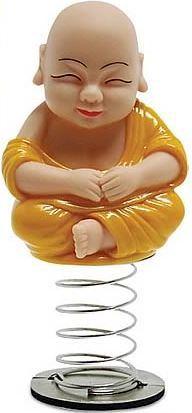 Taiwanese Buddhists believe that once a person dies, his soul leaves the body and hangs around the living for one hundred days, before taking off to the spiritual land to be reincarnated as another person, if he’s been a good person; OR, as the thing found on the bottom of one’s shoe after he’s been prancing around in a cow pasture, if the deceased had been a bad person.
Taiwanese Buddhists believe that once a person dies, his soul leaves the body and hangs around the living for one hundred days, before taking off to the spiritual land to be reincarnated as another person, if he’s been a good person; OR, as the thing found on the bottom of one’s shoe after he’s been prancing around in a cow pasture, if the deceased had been a bad person.
The first seven days after a person dies, he might not realize that he’s dead. His spirit may return home, only to discover he’s unable to eat bacon, pick out numbers for next week’s lotto drawing, and that wearing boxer briefs is now optional. After the spirit comes to terms with his death, he might be at a loss about what to do next. There’s no What to do in Case of Your Death? handbook. The deceased might be depressed about his fate, or he might want to visit some remote destination he’s always dreamed about, but the timing just doesn’t seem right. It’s the peak season; too many tourists. And his family! They might have returned from all corners of the globe and are a grieving, emotionally-paralyzed heap. How could he possibly leave them at a time like this?
Enter the Taiwanese Buddhist funeral ceremony. It ensures that the recently-deceased makes a smooth transition into his new life…that a soul can let go of his bodily existence and embrace his new, spiritual one…and that both the person who’s passed away and the family that’s left behind can achieve closure and move on.
After dad died, mom sent dad’s physical being to a funeral home, while his spiritual one was housed at an altar that contained dad’s picture, his name written on a paper sign, some offerings of food, paper money for the dead, and gifts of flowers from friends and family. The altar was among many in a three-storied building that housed the paper signs (ie. Spirits) of people who have recently passed away and have not yet been buried or cremated. The building was among many on that city block, which housed other altars. The city block contained many stores selling paper money, incense, houses, luxury cars, Rolexes, iPads, TVs and other consumer goods for the dead, urns for cremated remains, plots of burial land in the countryside. Across the street was a Buddhist temple, and across from the temple was a funeral home. This was your one-stop mega-outlet catering to the afterlife’s every need.
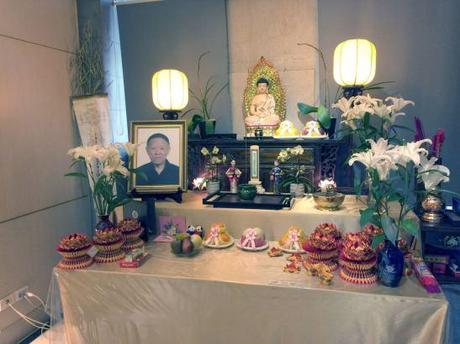
Dad’s temporary altar

Platform heels and Marlboros for the dead, who don’t have bunions and can’t get lung cancer.
To help us navigate through the mortuary mire, we hired Mr. Chen – a good-looking, likable guy in his late-twenties. He wore dark suits with white shirts and spoke to us in a quiet, hypnotic manner. He, along with an array of attractive, well-manicured young men and women, appeared as if they should be living it up in a Jose Cuervo commercial, instead of spending days in dark, incense-filled rooms with the bereaved, touring burial plots and mausoleums, setting up funeral altars, and preparing corpses for burial.
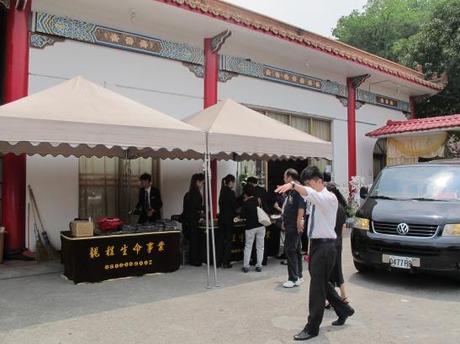
Mr. Chen directing traffic at the funeral
Mr. Chen is a Funeral Consultant. His mother is also “in the business”, and he’s been “in the business” for nine years. Death is BIG business in Taiwan, with potential earnings in the hundreds of thousand of dollars a year for someone like Mr. Chen. But unlike other businesses, where one’s success is gauged by repeat business or Google reviews, Mr. Chen only has one chance to get it right. And judging from his target market, who cannot express their appreciation by sending thank-you notes or home-made cookies, how could we possibly know that he might have gotten it wrong?
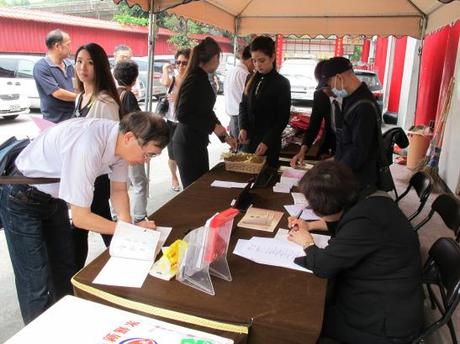
Bevy of funeral beauties (with long hair, standing, in black)
Like an NFL coach before the Superbowl, Mr. Chen rattled off a play-by-play of what was going to happen at the funeral. And even though I understood every word of what he said, I had no clue what he meant.
“About four hours before the ceremony, we’ll prepare your father for a spa day.”
“Right, a spa day.”
“The ladies will give him an essential oil massage. Then we’ll prepare him for the casket. Please don’t forget to let your mother know that she still needs to give me the single pearl that I will place over his mouth when he’s in the casket.”
“Uh huh…a pearl for dad’s mouth.”
“You and Annie will accompany the Teacher (Buddhist monk) from the temporary altar to the funeral home where the ceremony will take place. He will usher the spirit with something that looks like a stalk of corn and a bell. You will be holding a barrel with your father’s sign from the altar and three sticks of incense inside. Make sure the sign stays upright. The Teacher will be holding an umbrella over the barrel. You must follow him and the barrel must be in the shade of the umbrella. You will get into a car and the Teacher will drive you to the funeral. Whatever he says you have to repeat, got it?”
“Corn. Dad in a barrel. Bell-ringing monk. Umbrella, no light.”
“Once you reach the funeral site, there will be an emcee who will host the funeral and direct the proceedings.” Mr. Chen turned to a tall, handsome man looking at me sympathetically, like a game show host who knew that his schlep of a contestant was going to miss the million-dollar question and walk home with the consolation prize of a toothpick dispenser. “This is Mr. Wang. He is a professional funeral host and will ensure that that everything runs smoothly.”
Mr. Wang clasped my clenched fists in his soft hands, eyes brimming with tears. “Ms. Chang….I know how…difficult this must be for you and your family. But I want you to know that if there’s ANYTHING I can do, please do not hesitate to ask. I will try my very…VERY BEST to make the ceremony a truly memorable one, well-worthy of your great and honorable…FATHER!”
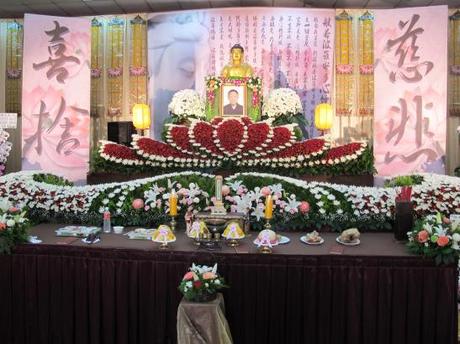
Dad’s altar at the funeral. Where’s Waldo Dad?
As a pre-teen, I had attended my great-grandmother’s funeral in Taipei. Being the immediate family, we had to wear smocks and dunce caps made from what seemed like the burlap sacks we bought our twenty-pound bags of rice in. Whenever someone paid his respects at the altar, we’d have to get on our hands and knees and kowtow to our guests in gratitude. Several hundred people attended the funeral, so we were on our knees the entire time. To set the appropriate mood, my parents had hired a team of professional mourners, whose job was to moan and wail endlessly. After a few hours of painful kneeling, listening to the depressing cries, and feeling impossibly hot and itchy, I was also bawling.
I barely remembered my great grandmother, but felt so uncomfortable by the clothes and the ceremony…and then felt guilty about feeling uncomfortable when my great grandmother was dead: Never to breathe, bemoan her hair loss, nor sneak drinks from my uncle’s stash of Scotch again. We, the living, will eventually take off our scratchy clothes, then go home and eat ice cream, but my great grandmother will never climb out of her coffin, glance at her dead person’s Rolex and announce that Happy Hour has started and the first drink’s on her. Everyone – from the cousin of a cousin who had never met my great grandmother to the annoying auntie who’d always pinched my cheeks whenever she saw me – was a complete mess. We were a miserable bunch, and the funeral was hailed as a great success.
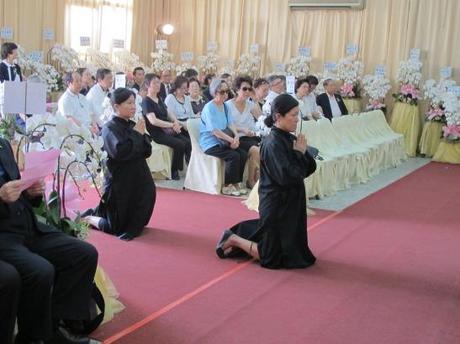
Annie and I kneeling in front of dad’s funeral altar
At dad’s ceremony, a misty-eyed Mr. Wang – backed up by a well-rehearsed Chinese instrument quartet – did the job of one hundred professional mourners. As Mr. Wang narrated the Indiana Jones version of dad’s life as an entrepreneur, who had once imported a container load of King crab legs and fur coats made from questionable Chilean rodents, only to have both quarantined, due to some kind of mange and insect infestation – the music would pause at the appropriate moments, crescendo to a fevered pitch, then soften to a minor key. Annie and I were likened to “orphans, crippled by the irreplaceable loss of their father”. Mom was the “devastated, grieving widow” who must somehow “find the will to carry on in the dark void” of her husband’s death. We were told to stand on either side of dad’s funeral altar and gaze adoringly at our dad’s picture till my contact lenses dried out and nearly fell off of my eyeballs.
“Oh, Susan, what a beautiful ceremony! I’m SO SORRY I didn’t keep in touch with your father these last few years. How terrible of me!” This was from a mother of six kids who were between the ages of 5 and 16, two of whom had ADHD and another two autistic.
“What a lovely man your father was. And he donated money towards building a school for the underprivileged in China! I had no idea, he never mentioned it before!” We had no idea, either.
“Aiya! I should’ve attended that dinner your father invited us to last year, but I just had hip surgery and was in the ICU, and the doctor said I should not leave the hospital. It was a matter of life and death, they said. Ha! What do doctors know! Who knew that would’ve been the last chance I had to see your father? Curse my decrepit old body! It’s all my fault!”
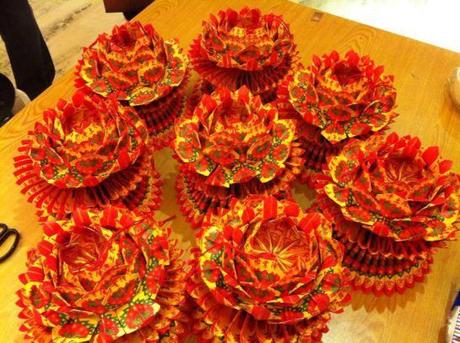
Hand-folded paper lotus flowers. They are placed in the coffin for cremation. Each flower is comprised of three parts held together by a red string. Each flower requires at least eighteen pieces of paper money for the dead, with each petal represented by one piece of paper. Annie made over one hundred of these flowers in a two-week time period.
Regardless of what we believe happens to someone after he dies, we bereaved are stricken with grief and guilt. We’ll REGRET not having tried harder to keep in touch with our loved ones when they were alive. We play what if scenarios in our head, believing that we could have somehow prevented the death. We’ll look for “clues” from our last conversation with the deceased, thinking there must be something there, which could have alluded to his fate. And although the deceased might have had hypertension, a triple bypass, and diabetes, due to her chain smoking and obesity – her death will still seem like OUR FAULT.
The success of a Taiwanese Buddhist ceremony – while ensuring an eternal happy life for the dead – relies heavily on the guilt and misery of the living. Annie folded impossible paper money lotuses till she got hives from the incense, her fingers blistered and she wished she were also dead. We wore black, couldn’t wear make up, and banned ourselves from all parties, weddings, and happy events for one hundred days after dad died to punish ourselves for being alive as a sign of respect. We took a ride with the spirit of our dead father in a wooden barrel and a directionless Buddhist monk with a dinner bell, then found ourselves going the wrong way down a busy one-way street. On an 80-degree day with 100% humidity, we donned heavy black robes and stood in front of a massive incinerator for twenty minutes, as we were forced to count then burn hundreds of millions of dollars of dead paper money, dad’s favorite outfits, a paper house, a paper iPad and bags of gold and silver nuggets in his honor. And, as our father’s casket was being pushed into the incinerator, we were told to yell, RUN FOR YOUR LIFE, DAD! – which his lifeless body failed to do – thereby forcing us to confront what was left of him an hour later.
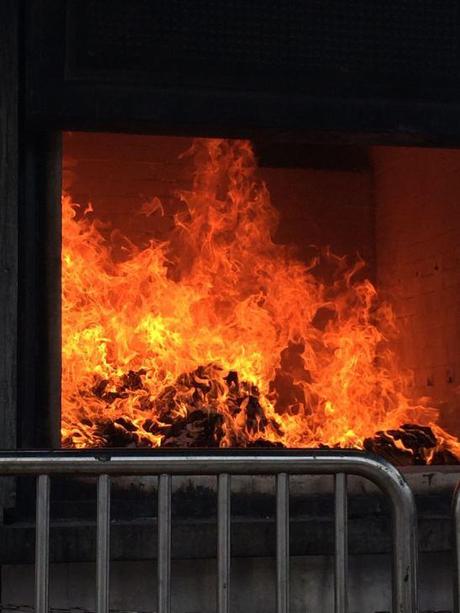
The *mini* version of the incinerator used for cremation.
As it was explained to us by Mr. Chen, the offspring of the deceased must not only witness the cremation, but also wait for the remains to cool off, then pick up one of her parent’s cremated bones with an ivory chopstick, place it in the urn, and carry this object in a fabric sling around her neck to the deceased’s final resting place.
“Hey, Dad, we’re putting you into the urn now! Um, okayyy…uh, here we go!”
We were told by Mr. Chen to announce this as we were performing the ceremony, because even though the deceased spirits can be summoned to and from their world at our bidding, once these beings arrive, they become like children – the vapid, uncooperative kind that must be asked many times to eat the offering of sweet buns before them, or coaxed into a car with a dinner bell and a stalk of corn, or cheerfully asked to be picked up by chopsticks and deposited into a humongous jade urn that weighs more than a child who’s eaten too many sweet buns.
As I waddled back to the hearse with Mr. Chen – me, holding the fifteen-pound urn against my stomach like a pregnant woman in her eighth trimester – Mr. Chen said that the ceremony went smoothly and that my father should be pleased. This was very different from what I believed. If dad had dropped in on his funeral, witnessed his daughters giving a barrel directions to the ceremony, then telling a pile of human remains they’re taking a trip into an urn, and he then received the bill for the whole thing, he would’ve thought it was all a colossal joke and that he had morons for daughters…which isn’t far from the truth.
But I get it. Funerals rites aren’t about the dead, but the living. How we lay the deceased to rest in our minds and our hearts is something every bereaved person must go through. Some of us may hold religious ceremonies to reassure ourselves that the deceased has successfully passed into his new life. Others prefer to scatter their dead relative’s ashes into the ocean, or another place where the deceased had found peace and solace when she was alive. There are also those among us who go home after the funeral, pour herself two glasses of gin and tonic then sit across from her father’s empty leather chair, the seat wrinkled and worn from years of sitting and contemplating. She then relates an incredible story about a Buddhist monk, her sneezing sister and herself riding in a Mercedes, as the ice in her father’s drink slowly melts, condensation takes over the glass, and it becomes too dark to see.

